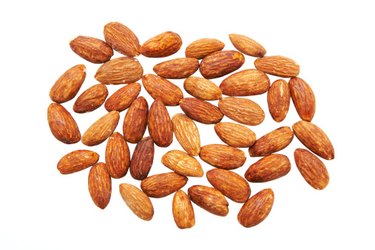
The FDA recommends adding almonds to your diet. According to the University of Nebraska Cooperative Extension, almonds have many benefits that can boost your overall health, as well as your weight-loss efforts. However, because almonds are a high-fat food, it's important to limit your intake. Remaining aware of the number of almonds in a serving will ensure that you get the vitamins and minerals that these nuts offer, without packing on pounds.
Serving Size
Video of the Day
The U.S. Food and Drug Administration says that 1 oz. is the standard serving of almonds. That's equal to one handful or about 23 whole, shelled nuts. If you aren't sure if you're getting the full serving amount, you should weigh your almonds as opposed to counting them. Some almonds vary in size and weighing is the most accurate way to determine serving size.
Video of the Day
Nutrition Info
The USDA Nutrient Data Laboratory says that 1 oz. of whole, shelled almond kernels contains 163 calories and about 14 g of fat. They're also a nutritious source of protein and fiber, with 6 g of protein and 3.5 g of fiber. People who are on low-carb diets often snack on almonds, as 1 oz. of almonds offers about 6 g of carbohydrates.
Consumption
The FDA recommends that you consume up to 1.5 oz. of shelled almonds per day or about 1/3 cup. You can either eat all the nuts as one large snack or munch on them throughout the day. Adding almonds to other dishes, such as salads, smoothies and trail mix, is also an efficient way to work in your nuts each day.
Benefits
In 2003, the FDA confirmed that eating almonds as part of a low-saturated-fat diet can reduce your risk of heart disease because they may help lower LDL or bad cholesterol. An ounce of whole, shelled almonds contains 75 mg of calcium. Additionally, almonds are packed with zinc, magnesium and vitamins E and B-2.
Considerations
As long as you keep track of your calorie and fat intake throughout the day, eating almonds can help you lose weight and prevent heart disease. However, because they are a moderately high-fat food, you should watch your intake to make sure they don't foil your efforts. Alice Henneman, of the University of Nebraska Cooperative Extension, says that consuming 1.5 oz. of almonds each day may actually help you eat less overall. That's because the fiber, protein and fat in almonds are quite filling and takes longer for your body to digest.